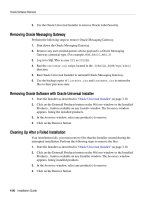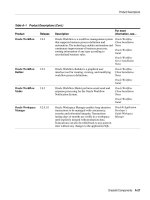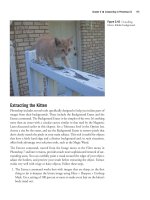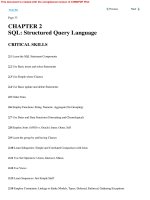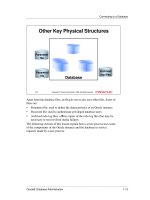Pro/ENGINEER Wildfire 3.0 Curriculum Guide phần 3 potx
Bạn đang xem bản rút gọn của tài liệu. Xem và tải ngay bản đầy đủ của tài liệu tại đây (249.96 KB, 12 trang )
Agenda
Day 1
Module 1 Introduction to Mechanism Design
Module 2 Creating Mechanism Connections
Module 3 Configuring the Mechanism Model and Analysis
Module 4 Evaluating Results, Animating, and Optimizing the Mechanism
Module 5 Project
Mechanism Simulation using Pro/ENGINEER Wildfire
3.0
Course Code TRN-1855-T
Course Length 1 Day
Overview
This course is designed for experienced users who want to add motion to their products and
analyze dynamic reactions of moving components. You will focus on learning advanced
modeling and analysis skills in this comprehensive, hands-on course. Topics include
developing the 3-D model, analyzing the mechanism model, and evaluating results. These
topics will enable you to measure dynamic reactions of components, measure the force
required to keep a mechanism balanced, and determine the resting state of a mechanism.
After completing this course, you will be prepared to work on mechanism designs using
Pro/ENGINEER Wildfire Mechanism Dynamics Option.
Prerequisites
• Introduction to Pro/ENGINEER Wildfire 3.0 or equivalent experience.
• Mechanism Design using Pro/ENGINEER Wildfire 3.0 or equivalent experience with
creating mechanism joint and cam connections.
Audience
This course is intended for product designers. People in related roles will also benefit from
taking this course.
Topics
• Identifying Differences between Mechanism Design Extension and Mechanism Dynamics
Option
• Applying Motors, Springs, and Dampers to Assemblies
• Applying Forces, Torques, and Gravity to Assemblies
• Creating Dynamic Analyses
• Creating Force Balance Analyses
• Creating Static Analyses
• Measuring Forces, Velocities, Accelerations, and Other Reactions on Assemblies
• Evaluating Results
Agenda
Day 1
Module 1 Introduction to Mechanism Dynamics
Module 2 Developing the 3-D Model
Module 3 Analyzing the Mechanism Model
Module 4 Evaluating Results
Module 5 Project
Mold Design using Pro/ENGINEER Wildfire 3.0
Course Code TRN-1890-T
Course Length 2 Days
Overview
Pro/MOLDESIGN provides the tools to create a mold model from start to finish by using the
mold design process within Pro/ENGINEER Wildfire 3.0.
In this course, you learn how to create, modify, and analyze mold components and
assemblies. Any changes made to the design model automatically propagate to the mold
components and assemblies. You learn how to create final extract components that reflect
the geometry of the design model, along with shrinkage considerations, adequate drafting,
mold features, and cooling systems.
You apply the concepts and techniques that you learn in the course to complete a mold
design project.
There is an optional appendix where you use mold layout to assemble a vendor mold base
and create ejector pins.
Pro/FICIENCY assessments are provided for you to assess your understanding of the course
materials. The assessment results also identify the class topics that require further review.
At the end of the class, you will either take an assessment via your PTC University account,
or your instructor will provide training on how to do this after the class.
After completing the course, you will have a better understanding of the mold design
process and how to create molded products by using the mold design process.
Prerequisites
• Introduction to Pro/ENGINEER Wildfire 3.0.
• Basic understanding of industry standard Mold design terminology and processes.
Audience
This course is intended for designers, machinists, and manufacturing engineers. The topics
in this course are also available as Web-based training courses.
Topics
• Introduction to Mold Design
• Analyzing Design Models
• Creating Mold Models
• Creating Sliders
• Creating Parting Surfaces
• Creating Mold Components
• Creating Mold Features
• Filling and Opening the Mold
• Using Mold Layout
Agenda
Day 1
Module 1 Introduction to Mold Design
Module 2 Analyzing Design Models
Module 3 Creating Mold Models
Module 4 Creating Sliders
Module 5 Creating Parting Surfaces
Day 2
Module 6 Creating Mold Components
Module 7 Creating Mold Features
Module 8 Filling and Opening the Mold
Module 9 Project
Pro/ENGINEER Wildfire 3.0 Update from
Pro/ENGINEER 2001
Course Code TRN-2101-T
Course Length 3 Days
Overview
With the release of Pro/ENGINEER Wildfire 3.0, there have been many productivity and
functionality improvements from Pro/ENGINEER 2001. These include a new user interface,
a consolidated set of feature tools, and the ability to interact directly with models and
features.
The Pro/ENGINEER Wildfire 3.0 user interface includes integrated web and folder browsers,
providing easy access to design information and model data. Pro/ENGINEER feature tools
utilize a dashboard interface, providing simple and intuitive access to options for creating
and editing features. Creating sketches has been made easier through use of new simplified
workflows. Modifying models is made easier through the use of drag handles that enable
dynamic modifying of model geometry, and the new undo/redo tool enables reversing of
operations such as deleting and editing features. There are many enhancements to feature
editing tools, including several new patterning options, and new tools for quickly and
dynamically grouping, copying and pasting features. Creating assemblies has been made
easier by utilizing a dashboard interface for assembling components. Creating drawings has
been made easier using a single new drawing view dialog box that consolidates all drawing
view options. Creating and editing of sheetmetal parts is now quicker through the use of
new dashboard tools that consolidate several wall types, enabling easy editing and
previewing of wall geometry and the ability to create multiple walls in a single operation.
At the end of each module, you will find a set of review questions to reinforce critical topics
from that module. Your instructor will discuss these with the class. At the end of the course,
you will find a course assessment in Pro/FICIENCY intended to evaluate your understanding
of the course as a whole.
Prerequisites
• Completion of T1779-320 Introduction to Pro/ENGINEER or equivalent experience.
Audience
This course is intended for people who will transition directly from Pro/ENGINEER 2001 to
Pro/ENGINEER Wildfire 3.0.
Topics
• User Interface.
• Using the new flexible workflow.
• Wildfire User Interface: Navigator, Folder Browser, and Integrated Web Browser.
• Spin / Pan / Zoom Operations and Orient Mode.
• Selecting and Editing Design Models.
• Methods for selecting components, features and geometry.
• Editing features and model dimensions.
• Modifying model geometry dynamically with drag handles.
• Changing design intent with undo and redo.
• Creating Direct and Datum Features.
• Feature tools: Holes, Rounds, Chamfers, Shells, Drafts.
• Datum tools: Axes, Planes, Points, Coordinate systems, Reference Features.
• Datum curves: Project, Wrap, Intersect.
• Sketcher Enhancements
• Sketcher Orientation: New workflows when using sketcher.
• Sketcher Palette: Predefined sections such as polygons and common engineering sections,
from a palette.
• Sketcher: Axis of Revolution, Sketched Text enhancements.
• Feature Enhancements
• Feature tools: Extrude, Revolve, Rib, Variable Section Sweep, Boundary Blend, Swept Blend,
and Warp Feature.
• Embedded Datum Features: Datum features created during the configuration of other
features are now embedded within the primary feature and hidden in the model tree.
• Partial Shell: Exclude portions of model from shell operation.
• Editing Features
• Patterns: Fill Patterns, Linear Directional and Rotational Axis Patterns. patterning along a
curve, patterning an existing pattern, and moving and mirroring of patterns
• Groups: Creating and modifying groups in the model tree.
• Duplicating Features: Copy, Paste, Paste Special, Mirror.
• Surface and Curve Tools: Fill, Trim, Merge, Extend, Intersect, Offset, Thicken, Solidify
• Managing Design Models.
• Creating Cross-sections.
• Relations and Parameters interface.
• Layers and the layer tree.
• Using the new search tool.
• Managing parent/child relationships.
• Web-based feature and model information tools.
• New Troubleshooter tool.
• Creating and Modifying Assemblies
• New Component Placement User Interface. New methods for placing components using
connections.
• Dragging components in assembly mode and real time collision detection when dragging
components.
• Undo and redo now available for common component operations.
• Assembly layers and assembly features.
• View Manager: Simplified Reps, Style Reps, Symbolic Reps, Explode Sates, Orientations, and
Cross-Sections.
• Flexible components and component interfaces
• Creating and Modifying Drawings
• Drawing Views. Control creation and modification of drawing views using a single new
drawing view dialog box.
• Creating and plotting shaded drawing views, this includes displaying clipped graphical views.
• Enhancements to BOM Balloons and Repeat Regions.
• Undo/Redo, Selection Mechanisms, New Pull-Down menu options.
• Drawing Standards: Additional options for display dimensions, geometric tolerances and other
drawing entities.
• Sheetmetal Enhancements
• New Flat Wall Tool. Four default wall shapes, plus all wall creation options in one new
dashboard.
• New Flange Wall Tool. Swept, extruded, and hem wall types consolidated into one dashboard;
also includes eight default wall shapes and all other wall options. Single operation to create
multiple walls and mitered cuts.
• Unattached Walls: New user interface for creating unattached flat and extruded walls.
• Sheetmetal Cut: Consolidated solid and sheetmetal cut tool, now uses new user interface.
Agenda
Day 1
Module 1 Introduction to Pro/ENGINEER Wildfire 3.0
Module 2 Selecting and Editing Models
Module 3 Creating Direct and Datum Features
Module 4 Creating Sketch-Based Features - I
Day 2
Module 5 Sketcher Enhancements
Module 6 Creating Sketch-Based Features - II
Module 7 Patterning Tools
Module 8 Editing Tools
Day 3
Module 9 Managing Design Models
Module 10 Assembly and Mechanism Tools
Module 11 Creating and Configuring Drawings
Module 12 Sheetmetal Enhancements
Creating 3-D Drawings using Pro/ENGINEER Wildfire
3.0
Course Code TRN-2104-T
Course Length 1 Day
Overview
After completing this two hour session, you should be able to create Pro/ENGINEER models
with embedded information like dimensions, notes, GD&T, and surface finishes. In addition,
you learn how to add information related to manufacturing tools, and manufacturing
processes. You can use the 3-D Drawings for planning the downstream process map,
layouts, and tools at an early stage of the product development cycle. At the end of
the session, you will be able to create 3-D drawings compliant to the ASME Y14.41
standard, manage the information added, display and use this information in traditional 2-D
drawings if needed.
Pro/FICIENCY assessments will be provided in order for you to assess your understanding of
the course materials. The assessment results will also identify the class topics that require
further review. At the end of the class, you will either take an assessment via your PTC
University account, or your instructor will provide training on how to do this after the class.
After completing this course, you will be well-prepared to create 3-D drawings using
Pro/ENGINEER Wildfire 3.0.
Duration
2 hours
Prerequisites
• Introduction to Pro/ENGINEER Wildfire 3.0.
• Pro/ENGINEER Wildfire 3.0 Update from Pro/ENGINEER Wildfire 2.0.
Audience
This course is intended for mechanical designers, design engineers and related roles. The
topics in this course are also available as Web-based training courses.
Topics
• Describe the Digital Product Definition.
• Create 3-D drawings using Annotation features.
• Use Annotation features to add notes, dimensions, geometric tolerances, surface finish
and manufacturing information.
• Create 2-D drawings using Annotation elements.
• Group and manage the information in 3-D Drawings
Agenda
Day 1
Module 1 Creating 3-D Drawings using Pro/ENGINEER Wildfire 3.0
Top-Down Design using Pro/ENGINEER Wildfire 3.0
Course Code TRN-2110-T
Course Length 3 Days
Overview
Pro/ENGINEER Wildfire 3.0 has a wide range of tools that support the top-down design
process. Simply using these tools in your design does not constitute a top-down desi
g
n.
Top-down design is a process in which a product design is planned, structured and executed
on from the top level.
In this course, you will first learn to use tools within Pro/ENGINEER that support top-down
design process. Layouts, Skeletons, Publish Geometry and Copy Geometry features are
fundamental ingredients to any top-down design process.
After learning how to use these tools, you will begin a top-down design project in which you
are part of a project team tasked with developing a home security camera. Using the top-
down design plan as your guide, you will complete the design by taking on the role of
various project team members and completing their assigned design activities.
At the end of each day, you will complete Pro/FICIENCY skills assessment questions. These
questions are used to help reinforce your understanding of the course topics and form the
basis for daily review sessions.
After completing the course, you will have a better understanding of the top-down design
process and how it can be implemented using Pro/ENGINEER Wildfire 3.0.
Prerequisites
• Introduction to Pro/ENGINEER Wildfire 3.0.
• Pro/ENGINEER Wildfire 3.0 Update from Pro/ENGINEER Wildfire 2.0.
Audience
This course is intended for any advanced Pro/ENGINEER users within a company. General
users will learn about top-down design and the tools supporting it. Internal support people
will learn how to best use top-down design.
Topics
• Using top-down design fundamentals.
• Creating and using design layouts.
• Creating and using skeleton models.
• Creating and using copy geometry features.
• Creating and using publish geometry features.
• Creating a top-down assembly structure.
• Using reference controls and investigation tools.
• Planning and documenting a top-down design.
• Distributing design tasks for concurrent development.
• Importing and exporting ECAD data.
• Using display styles.
